Justin Gregg's Blog, page 5
October 8, 2013
A New Frontier in Animal Intelligence (for Scientific American)
October 4, 2013
Top 5 Most Endangered Dolphin Species (and how you can help)
Although many dolphin species enjoy happy, healthy population numbers, there are a handful of species that are drawing closer to extinction with each passing year. In honor of World Animal Day, here are the top 5 most endangered dolphin species together with links to conservation organizations fighting to save them from extinction.
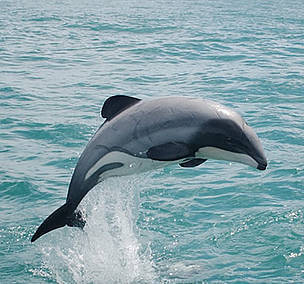 Maui’s dolphin
Maui’s dolphin
Maui’s dolphin lives off the coast of New Zealand, and with just 55 animals alive today, is the most endangered dolphin species. It is considered Critically Endangered by the IUCN. The biggest threat to this small population is entanglement in fishing gear, and conservationists fear that unless immediate action is taken to prevent entanglements, extinction of this species is imminent. More info here.
*************************
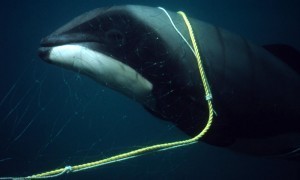 Hector’s dolphin
Hector’s dolphin
Hector’s dolphins inhabit a small range off the coast of New Zealand. They are listed as Endangered by the IUCN, with approximately 7,000 individuals alive today. Like all marine mammal species, they are threatened by vessel traffic and pollution, but are particularly vulnerable to fishing gear entanglement and habitat loss due to coastal development. More info here.
*************************
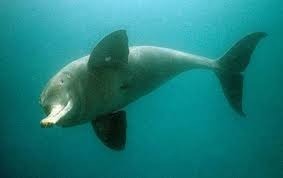 Indus and Ganges River dolphin
Indus and Ganges River dolphin
The Indus and Ganges River dolphins (once considered two separate species, but now thought to be the same species) are listed as Endangered by the IUCN. These freshwater dolphins live in the rivers of India, Pakistan, Nepal, and Bangladesh. There are fewer than 2,000 Ganges River dolphins, and around 1,000 Indus River dolphins remaining today. The populations have been declining due to human activity, including habitat destruction due to dam construction, fishing gear entanglement, pollution, prey depletion due to over fishing by humans, and deliberate killing for human consumption. More info here and here.
*************************
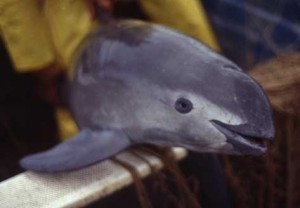 Vaquita
Vaquita
The vaquita is a porpoise species (not a dolphin species), but is considered the world’s most-endangered cetacean (after Maui’s dolphin), and thus warrants mentioning. It is listed as Critically Endangered by the IUCN, with as few as 560 animals alive today. Their numbers have been drastically reduced in recent decades due to entanglement in fishing gear – specifically gillnets. More info here.
*************************
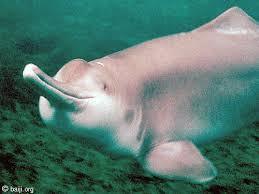 Baiji
Baiji
The Baiji or Yangtze River dolphin is listed by the IUCN as Critically Endangered, but is considered by most scientists to be functionally extinct. This means that during the last extensive survey undertaken in 2006 to find the Baiji, scientists did not see a single animal. There were over 6,000 Baiji recorded in the 1950s, but their numbers had dropped to around 400 animals by the 1980s. By 1997, there were only 13 Baiji remaining. It is possible that there is still a Baiji out there somewhere, but even if there is, this species has almost no chance of recovering its numbers, and is thus functionally extinct. The major threats to the Baiji were/are due to human activity, including fishing gear entanglement, pollution, and habitat destruction. In a sad testament to the loss of this species, the website of the organization created to save the Baiji (www.baiji.org) is no longer active.
*************************
The precarious future of ocean megafauna (for OUP Blog)
September 27, 2013
Der Spiegel article clarifications
An article appeared in Der Spiegel about Are Dolphins Really Smart? this afternoon. Here’s just a quick clarification of some points made in the article:
1) The setup leads to the question “Really? Are chickens as smart as dolphins?” Of course the answer is no (which I’ve stated many times). The mention of chickens in the book is a device to help the reader understand the unscientific nature of comparing “intelligence” between species, and to note that many animals that we often think of as unintelligent do in fact display intelligence. This is an attempt to highlight the difficulties in translating the science of ‘comparative cognition’ into the non-science of ‘comparative intelligence.’
2) The article discussed Paul Manger’s ideas alongside what I state in the book, perhaps leaving the impression that I agree with all of them. This is not the case. Some of Manger’s points are valid, but I also dedicate many sections of the book to explaining some of the the problems that scientists have noted with his arguments. As for his comments in the Der Spiegel article, I would disagree with many of them, including ”The essential features of complex neural processing of information, as observed in other mammals, are missing or poorly developed”‘ and “”Exactly what the dolphins do with the sponges remains unknown,” he says, noting that the evidence they use them as tools is “flimsy,”‘ and ‘”We put them on a pedestal for no reason.”‘
3) Contrary to Manger’s points in this article, I argue that dolphins’ use of symbols in the lab is exceptional and evidence of complex cognition. I also disagree with his assessment of the mirror self recognition test as it pertains to being able to see the mark.
4) I also did not state what was written in the penultimate paragraph: “We have to stop describing them as ‘special’,” says Gregg.” The thrust of my book is not about suggesting that dolphins are “average” or “less special” and I most certainly did not suggest that in the email interview. In fact, I even provided some reasons explaining why we could consider them special! To see what I actually wrote in my email interview with Der Speigel, here is a copy of the entire interview (handy, eh? This is why I prefer email interviews):
Why do you think is it that humans consider dolphins particularly intelligent?
First and foremost, there is a large body of scientific evidence from the past 50 years that strongly suggests that dolphins are intelligent animals. But long before we knew much about dolphins from a scientific perspective, Western culture – starting in the early 1960s – was inundated with popular ideas about dolphins possibly being just as intelligent – or more intelligent – than human. The combination of these two factors has resulted in our current ideas about dolphin intelligence.
Can a special intellectual status be assigned to cetaceans?
This all depends on what one considers ‘special.’ Dolphins in particular display a number of complex behaviors stemming from complex cognition that one rarely sees in the animal kingdom – usually things seen in primates or corvids. This includes things like symbol comprehension and mirror self-recognition. So as far as these specific traits go, these animals are ‘special’ from a cognition perspective. But our criteria for determining what is ‘special’ has, historically, been quite fickle. We once considered tool use a ‘special’ trait, but it is now known that it is rather widespread in the animal kingdom, and therefore less ‘special’ than it once was. The idea of what is ‘special’ is not something that can be answered by science – it is a philosophical or moral question, and depends on the ethical perspectives of the person asking the question.
What is wrong with the notion that they are smart/special?
There is nothing at all wrong with thinking dolphins are smart and/or special. But when we approach this question purely from a scientific perspective and ask how unique the behaviors are that dolphins display, it turns out that many species are displaying the kind of ‘smart’ behaviors that we used to only attribute to dolphins and primates. So it is a helpful exercise to look at the science of animal cognition to determine how widespread traits are that we commonly – and sometimes wrongly – consider unique to traditionally ‘smart’ species.
Which would be mammals you would be willing to compare to dolphins with in terms of intelligence? Or is such a comparison not helpful at all?
I believe quite firmly that it is impossible to make these kinds of comparisons. We have no scientifically valid definition of ‘intelligence’ which makes it impossible to reliably compare the intelligence of different species. We can only say what cognitive traits certain species might share. For example, social learning is observed in dolphins, primates, and fish. Echolocation is observed in dolphins and bats. But what does this mean in terms of the overall intelligence of these species? Nothing really. Often when we ask how ‘intelligent’ an animal is, we are simply asking how ‘human-like’ that animal’s behavior is, which is not a particularly scientific thing to do.
Do you agree with e.g. the Non-Human Rights Project that dolphins should be granted the legal status of personhood / the same ethical and moral consideration as human beings?
I discuss these ethical movements in the book, but am very careful not to take a position on these issues. The book is an unbiased, objective assessment of what science knows about dolphin cognition. I sincerely hope that the information in the book can be used be any individual from any ideological background as an unbiased source of scientific information. My own opinion on these matters is entirely irrelevant since I am simply providing an objective overview of the science.
Why is it important to deconstruct the dolphin myth? Is it harmful to put these animals on a pedestal? If yes, why?
I think for the most part there is no harm in thinking that dolphins are supernaturally intelligent, or even more intelligent than human beings. I do however think that the general public should get more excited about the field of animal cognition, and want to delve deeper into the question of ‘just how smart are dolphins’ and look to the sciences for more information. I would love to see that people don’t simply accept everything they see online about dolphin super-intelligence, but instead feel the urge to get to the bottom of some of the stranger claims (like the idea that dolphins can teleport people to Mars). There’s simply a lot more to the science behind dolphin intelligence than most people believe, and it is a lot of fun to learn how scientists go about probing the nature of dolphin minds. I am keen to share my passion for critical thinking with the public on one subject that has always fascinated me: the idea of dolphin intelligence.
How important was your work on dolphin communication in leading you to the conclusions laid out in the book? What did you learn about the animals through your studies that is not consistent with the notion that they are “special”?
When I first started my research, I was taken with the idea that dolphins might have a sophisticated language that functioned a lot like human language. After spending the better part of a decade researching and thinking about this topic, I realized that a lot of my initial ideas about dolphin language clashed with what science actually knows about the nature of dolphin communication. I had always considered dolphin communication to be uniquely sophisticated, but after learning about how other animals communicate – especially the sophisticated alarm call systems of prairie dogs or the fascinating bee waggle dance – I have come to realize that a lot of other species are displaying complex communicative behavior, and that I should maybe not have been so quick to put dolphins on a pedestal.
At times, the discussion around cetacean cognition seems to be quite emotional (e.g. Manger vs. Marino). Why is this the case in your opinion?
People are very passionate about dolphins in general. They are a large, intelligent animal that is often very curious and friendly toward humans. It is hard not to form emotional attachments to dolphins – especially if you’ve ever encountered them swimming alongside you in the open ocean. So I think many people simply don’t enjoy hearing about the possibility that dolphins might sometimes be aggressive animals, or that science is not in fact all that sure about how complex their minds are. The exchanges between Manger and Marino, however, focus primarily on questions of the best interpretation of the scientific data. I don’t think it will surprise anyone that scientists can be just as passionate as anyone else when it comes to arguing their point of view. I dare say you can find equally as passionate exchanges in the ant or primate cognition literature.
So I leave it to the reader to make the determination as to whether or not what I wrote in the interview comes across in the Der Speigel article.
Why write a book about dolphin intelligence? HINT: not to make money.
My book on dolphin intelligence was published this week, and I am pretty psyched about it. It was a labor of love that took over two years to go from idea to final product. Because I tackle the thorny issue of the science of dolphin intelligence, I have had a few (not too many) response to the book that were less than pleasant. While the overall response has been extremely positive, a couple people have said that I am promoting the idea that dolphins are ‘dumb’ to sell books and make money, which is wrong for two reasons: 1) the book in fact suggests that they are intelligent, and 2) I am not in this to sell books.
That’s right: I don’t expect to make money off of this book. Anyone familiar with publishing via an academic press will know what I’m talking about, but here are the details:
I was paid an advance to write the book by my publisher (I won’t disclose the exact amount since I am not sure if this is kosher). It was, by all accounts, a very modest advance. In most cases, total sales over the lifetime of the book are not enough for the author to earn royalties in addition to what they receive on their advance (7 out of 10 books do not earn back their advance). So unless Oprah buys a million copies of the book to give out to her followers, the advance is very likely the only money I will see.
But I had to invest in a few things in order to write the book – which came out of my advance. This includes a huge stack of science books on the topics I was researching (which is where most of the money went), as well as some office and web expenses here and there. After deducting the expenses from the advance, I was left with less than half of what I started with. Now I also need to pay taxes on this money, which took away a third of what was left.
So if we now calculate how much money I netted per hour for writing this book (which I did part time over the course of two years), this is what we end up with: 95 cents an hour. That is approximately 8 times less than the US minimum wage.
In other words, I did not write this book to make money. I knew full well what I was getting into, and ‘getting rich’ off of publishing an academic book about dolphin cognition was an obvious impossibility. So why bother spending so much of my life writing this book?
It’s not for political reasons. I’m not fighting for a cause. As I state in the book, I do not adopt an advocacy position when talking about the science. I am simply providing an impartial overview of the scientific literature – so there was no pro- or anti-whatever reason that inspired me to write it.
The reason I wrote it was simple: I love science. I love animal cognition science in particular. I love thinking about it, I love talking about it, and I love writing about it. I love engaging the public in discussions about animal cognition. I would love it if people who also enjoyed these topics were to read the book and learn something they didn’t know. I love the possibility that people will read it and challenge their own ideas about certain topics (especially some of the more fanciful ideas about dolphin super-intelligence), and want to dive deeper into what the science says, and how scientists go about studying animal minds.
I am also not that keen on things like ‘fame’ or ‘notoriety’ – in fact, I am loathe to talk with the press/media about the book since many people are twisting what I say in the book to accommodate sensationalistic headlines. I’d rather let the book speak for itself, and spend my time drinking coffee in the garden or watching Battlestar Galactica.
I wrote the book because I love the topic. It’s as simple as that. And as a bibliophile with more books in my house than is healthy for me (or that I could possibly read before I die), I am very excited to see a book spine sticking out of my bookshelf with my very own name printed on it.
If you love science, animal cognition, or the topic of dolphin intelligence, I am hoping you will enjoy reading the book. I know that I enjoyed writing it – even if it is a silly way to make a living.
September 10, 2013
Anatomy of a misquote
I have been wronged, interweb friends! After being interviewed about my upcoming book by the Sunday Times, a series of news stories appeared where it was alleged that I stated that “dolphins are dimmer than chickens” and that dolphins engage in “gang rape.” I never said such obvious nonsense. The source for this “quote” appears to be a little editorial piece that accompanied the main article in the Sunday Times. It was only a few sentences long, and I think was meant to serve as a kind of light-hearted overview of the full article. Unfortunately, it included the following problematic sentence: “Not only are dolphins dimmer than the average chicken, says Justin Gregg, a zoologist, but they are capable of gang rape and acts of violence.”
The thing is, I didn’t say any of this. In fact, I harped on the point in my interview with the Sunday Times that it is wrong to suggest that dolphins are dumb, and that my book was about elevating the intelligence of other animal species, not about suggesting that dolphins are not intelligent. I have argued on my blog and in the book that dolphins are highly intelligent animals, but that it’s generally impossible to compare intelligence between species in this manner. In any event, dolphins quite clearly display more complex behavior than chickens on the whole, so this statement is wrong no matter how you slice it.
Furthermore, I have argued quite vehemently that there is no such this as dolphin rape. In fact, if you Google ‘dolphin rape’ you will see that my blog post debunking this myth is the first thing that comes up. I receive a huge number of visitors to my blog each day coming from internet searches for the phrase ‘dolphin rape.’ (sidenote: Why are you so interested in dolphin rape interwebs? Seriously, why?) In any event, I would never suggest that dolphins engage in gang rape. That is patently false.
But the meme of ‘dolphins dumber than chickens’ spread like a virus through the interwebs, and the painstakingly argued points I raise in a scholarly book that took me years to write have now been supplanted by an asinine quote that I would never have said AND strongly disagree with. To learn about what I actually say in my book, please read this blog post written in my own words or – better yet – the actual book!
September 8, 2013
Are dolphins dumb?
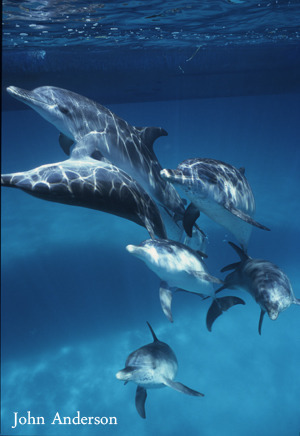 Dolphins are certainly not dumb, but there’s more to the story of dolphin intelligence than most people would like to believe.
Dolphins are certainly not dumb, but there’s more to the story of dolphin intelligence than most people would like to believe.
Ever since the neuroscientist John C. Lilly declared dolphins to be “more intelligent than any man or woman,” the public has had a love affair with our big-brained cousins of the sea. In the fifty years since Lilly first arrived on the scene, researchers have compiled a laundry list of cognitive feats displayed by dolphins that give us good reason to suspect that they are intelligent animals. Much of this evidence is making its way into powerful arguments by advocacy groups calling for increased rights and protection for dolphins based on their intellectual capacities. Some argue that dolphin intelligence is so extraordinary that we have a moral obligation to treat them better.
Not all scientists are necessarily on board with the idea of extraordinary dolphin intelligence, however. Professor Paul Manger (of “dolphins are dumber than goldfish” fame) recently published a scientific article arguing that the evidence of advanced dolphin cognition does not hold up to scrutiny. And I am publishing a book in a few weeks titled “Are Dolphins Really Smart? The Mammal Behind the Myth” wherein I take a sober look at all of the claims of dolphin extraordinariness. Unlike Manger, I argue that dolphins do in fact display startling skill in some of the areas we associate with intelligence, like symbol use and social cognition. But I also argue that when we put dolphin intelligence in context by looking at the intelligent behavior displayed by other species, and by coming to grips with how little we know about animal cognition in general, the argument for dolphin intellectual superiority gets doused with a bucket of cold, salty water.
These are the main arguments from Are Dolphins really Smart?
–> Dolphins do a lot of complex things like use tools, hunt cooperatively, transmit learned behaviors via something akin to culture, live in extremely complex social groups, play complex games, display altruistic behavior, etc. But most of these behaviors are no longer considered all that unusual in the animal kingdom and are thus not extraordinary. They’re observed in a great many species, from insects to birds to fish.
–> Scientists understand very little about the way dolphin brain size and brain structure relates to their behavior, or whether or not things like the Encephalization Quotient (EQ), cortex size, or the presence of von Economo neurons are valid indicators of intelligence.
–> Although dolphins pass the mirror self-recognition test (MSR), scientists don’t really understand what this means in terms of the kind of self-awareness dolphins possess, or how this relates to the idea of consciousness. These are difficult things to study in non-human animals, and scientists are constantly arguing over what these types of experiments say about animal minds.
–> Although dolphins display competence in cognitive tests involving problem solving, memory, symbol use, object permanence, and planning, other species that we don’t historically associate with extreme intelligence (like scrub jays, parrots, pigeons, and domestic dogs) sometimes perform better on these tests than dolphins.
–> Although dolphins are unusually good at learning to understand symbol systems in experimental settings, it’s probably not the case that dolphins have their own language which is as complex as human language. It’s also unlikely that they’ll one day learn to use an artificial symbol system to hold complex conversations with human beings.
–> Scientists understand next to nothing about how dolphins experience their emotions, or the extent to which they have complex emotions like empathy or grief.
–> Dolphins are not abnormally peaceful animals that live in harmony with their environment. They show exactly the right mix of aggressive and friendly behavior that you’d expect from a long lived, socially complex carnivore.
If dolphin intelligence turns out to be more standard than special, does this mean that the high-profile campaigns for dolphin rights or dolphin protection don’t have a leg to stand on? No, this is not the case. Science alone has little to say on the issue of welfare or rights. Science simply produces naked facts that are then fed into a moral Cuisinart which churns out ‘right’ and ‘wrong’ edicts that depend entirely on the predilections of the chef. In fact, many animal conservation and welfare efforts focus not on the intellectual capacities of animals, but solely on their ability to suffer. A species need not be an intellectual giant to nonetheless deserve to be free of unnecessary pain and suffering. Or to be given the chance to avoid extinction.
And even those ethical arguments that are based on the intelligence of dolphins need not be shaken by the revelation that science knows precious little about dolphin minds. Advocates have a very powerful strategy in suggesting that if there’s even a little evidence suggesting that dolphins might have intellectual capacities that render them in need of special attention, we should give them the benefit of the doubt. And this is a position that is not easily opposed given the ambiguous nature of the findings concerning animal cognition. But, there is also plenty of wiggle room to argue that a large number of species should also fall under this ‘err on the side of caution’ heading, like chickens, rats, and pigs. It’s more a matter of taste than of science in terms of where we should draw the line. The intersection of science and ethics churns up fertile ground in which philosophers and advocates are free to plant their seeds. Dolphin extraordinariness is but one in a myriad of possible shoots to emerge.
The bottom line is that we’re seeing more and more evidence that animals like insects, cephalopods and fish display cognitive capacities that easily fall under the heading of intelligent. Dolphins will certainly never be re-classified as dumb animals, but as the field of animal cognition continues to provide us with evidence of intelligence scattered across the animal kingdom, dolphins might well find themselves facing stiff competition for the title of second most intelligent animal. And some of that competition might be coming from those species we currently find in our pet stores, if not on our dinner plates.
Are Dolphins Really Smart? is not a book about the stupidity of dolphins. It’s a book about the underappreciated intelligence of the other species with which we share this planet. It’s also a confession as to how little science really understands about the animal mind. In the end, I leave the reader with this final message: “Dolphins are marvelous, wondrous, and charismatic animals, but if we can stop looking at them through the narrow lens of the human condition by which we judge them as “special,” we might open our minds and our hearts to the fact that many other species—from sharks to earwigs to rats—lead equally as wondrous and worthy lives.”
For more info and to purchase a copy of the book, visit: aredolphinsreallysmart.com
August 29, 2013
Dolphin wet dreams: spontaneous ejaculation in a dolphin (never before seen)
Get a load of this everyone: researchers have – for the very first time – recorded a case of spontaneous ejaculation in a wild dolphin. This world premier video (below) shows a male Indo-Pacific bottlenose dolphin near the island of Mikura in Japan swimming peacefully along when suddenly… well, just watch:
Important facts about this little episode:
1) This dolphin was likely asleep or otherwise drowsy just moments before he ejaculated.
2) The dolphin had not been engaged in any sexual activity before the event occurred. No masturbation, cavorting with females, or socio-sexual behavior with other males. He was resting, suddenly produced an erection, and then BOOM.
3) None of the other dolphins in the group were engaged in sexual behaviors either – everyone seems to have been resting.
This is exactly the same kind of phenomenon we observe in human wet dreams: spontaneous ejaculation in the absence of physical stimulation. It has been observed in other mammals (mice, guinea pigs, cats, etc.), but never before in a dolphin. What’s the function of spontaneous ejaculation? There are three hypotheses: 1) it’s needed to remove excess or abnormal spermatozoa, 2) it’s a kind of sexual display, 3) it has no function, and happens by accident when a sleepy/drowsy brain stops being able to regulate the inhibitory neural control system.
Bottom line: this is a NEW DISCOVERY and I dare say that these enterprising young researchers have just put themselves in line for an Ig Nobel.
***
 Tadamichi Morisaka, Mai Sakai, Kazunobu Kogi, Akane Nakasuji, Kasumi Sakakibara, Yuria Kasanuki, & Motoi Yoshioka (2013).
Tadamichi Morisaka, Mai Sakai, Kazunobu Kogi, Akane Nakasuji, Kasumi Sakakibara, Yuria Kasanuki, & Motoi Yoshioka (2013).
Spontaneous Ejaculation in a Wild Indo-Pacific Bottlenose Dolphin (Tursiops aduncus)
PLOS ONE DOI: 10.1371/journal.pone.0072879
***
August 24, 2013
Just so we’re clear: Dolphins are pretty smart
My book (Are Dolphins Really Smart? The Mammal Behind the Myth) is slated for publication in a few weeks, and I’ve just seen my first review/summary of the book online – posted by Jessa Gamble over at The Last Word On Nothing: “ Dolphins: Largely Unexceptional.” Jessa does a good job of outlining some of the major points in the book. I also bumped across the first sensational/controversial headline based on Jessa’s post: “Dolphins may be just as dumb as fish.” Although the post itself is good, that’s certainly not a headline I would support. To begin with, I agree with Maggie Ryan Sanford that “dumb” and “smart” are not appropriate terms to describe the nature of animal cognition, which is one of the main messages of my book (and why I pose the question in the title).
My takeaway: "smart" & "dumb" aren't the right terms. @JessaGamble reviews @justindgregg on dolphin intelligence http://t.co/lddm6QGgCo
— Maggie Ryan Sandford (@Mandford) August 23, 2013
The main arguments in my book are as follows:
1) It’s true that dolphins do display a pretty impressive mix of skills resulting from complex cognition, so there’s good reason to consider them smart. But there’s much more to the story than most folks realize. When we take a hard look at the details of the science, it turns out that we understand very little about dolphin cognition, which makes it difficult/dangerous to make concrete statements about the nature of their intelligence.
2) It is really difficult to study animal cognition, which makes cross-species comparisons involving “ranking intelligence” mostly meaningless.
3) Intelligence itself is a term that is synonymous with the idea of “how human-like is this animal’s behavior,” which is not a particularly scientific starting point when doing comparative cognition.
4) A lot of the things that dolphins do that we consider unique or extraordinarily intelligent are in fact far more widespread in the animal kingdom than most people realize.
5) There are a lot of unfounded beliefs about dolphins and dolphin behavior that don’t stand up to scientific scrutiny.
I by no means argue that dolphins are “dumb.” Quite the opposite. Instead, I argue that many animals we currently consider “dumb” turn out to be similar to dolphins when it comes to our ideas of “intelligence” in animals. So a better headline would be as follows: “Fish may be just as smart as dolphins when it comes to certain aspects of cognition like social learning and tool use, but dolphins perform better than fish at tasks involving problem solving or self-awareness, although the study of fish cognition is relatively new which means we’re likely to learn that fish excel at many cognitive tasks on which they’ve not yet been tested.” As you can see, that makes for a terrible headline. Which highlights the nature of the problem: these are complex issues, and before we try to boil them down into catchy and provocative headlines, it’s probably a good idea to explore the topic in detail. Which is what I do in my book. If you do happen to read it, I bet you’ll agree with me that dolphins are in fact pretty smart, but so are a lot of other animals.
July 1, 2013
Behind the scenes on a BBC nature documentary
I spent last week on the island of Bimini in The Bahamas together with a film crew from the BBC, and witnessed nature documentary sausage being made. They were on Bimini to shoot sequences for an upcoming science/nature documentary on animal intelligence, and were following along with the research that my research org (the Dolphin Communication Project) conducts with wild spotted dolphins.
Now I’ve watched plenty of BBC nature documentaries, and have always been happy with the BBC’s ability to make science sexy without resorting to sensationalist or anti-science practices. Things like pawning off fake documentaries as real ones (Mermaids), or suggesting that the presenter is ‘abandoned’ in the wild when he is actually staying in a nearby hotel (Bear Grylls), or having a presenter ‘rescue’ snakes from a pool that had been purposely thrown in there by the producers (Turtleman). I’m pleased to say that nothing I saw on Bimini resembled these types of shenanigans. Sure they needed to re-shoot a few interviews in order to re-create a previous conversation that had happened right after swimming with the dolphins, but these are the necessary evils when shooting in the field. Sometimes the lighting was just not right, or the audio was masked by boat engines, or the presenter was out of breath. But it was all above board. And being behind the scenes on a documentary shoot made me appreciate the amount of work that goes into this type of project. The crew were working flat out for days on end, spending hours and hours prepping for shots that will only be onscreen for a moment or two in the finished version.
Only one aspect of the process left me feeling uneasy. Perhaps it was my own naivete when it comes to these things, but I had expected our researchers to sit down with the producers and presenter and spend hours discussing dolphin science over a couple of beers. In my head, I thought that these conversations would be used to shape the final outcome of the documentary. But once we got into the business of filming, it was obvious that the background research had already been conducted, and the crew was there to breathe life into the script by filling it up with shots of dolphins swimming around the presenter, and recording a handful of interviews with DCP researchers as they answered specific questions. Obviously the interviews and the dolphin behavior will form the basis for the documentary, but I had the feeling that there was not much room to explore topics that were off-script. I suppose this makes sense insofar as it costs a lot of money to send a film crew out to a field site, and you can’t just wing it once you’re out there. You need structure. You need a plan.
The problem is, I was never 100% clear what the plan was. I know that this documentary is about animal intelligence, and social behavior in particular. And I know they’ve interviewed other dolphin researchers like Lori Marino and Diana Reiss. But I was unsure as to the exact angle or message that the documentary was going for. Not that the BBC folks were necessarily being tight-lipped, but they were not in the habit of sharing all of the details of the project with the scientists they work with. Unfortunately, all this vagueness left me wondering what their end-game was. Would the shots they filmed with us end up in some sensationalist puff-piece about dolphins being the second most intelligent animal on the planet? Were they going to suggest that humans and dolphins will one day be able to hold two-way conversations in the way John Lilly had predicted? Would they address the current legal battles concerning dolphin personhood? How were they planning to tackle controversial subjects like captivity? None of this was clear. I know that I – as well as my colleagues at DCP – could have helped them explore these ideas. But I fear that our input would only have received polite smiles. The plan, whatever its details, had already been set in stone before they arrived on Bimini.
Now I do trust the BBC. And I trust the director of this documentary – he came across as a science-minded guy with a serious academic interest in animal behavior. But the current spate of Mermaids/Grylls/Turtleman foolishness has made me nervous. We just have to keep our fingers crossed that the science is not going to be distorted for the sake of compelling television and wind up as docu-nonsense. I don’t expect it will. I am very much looking forward to the final product, and to seeing our research on film.




